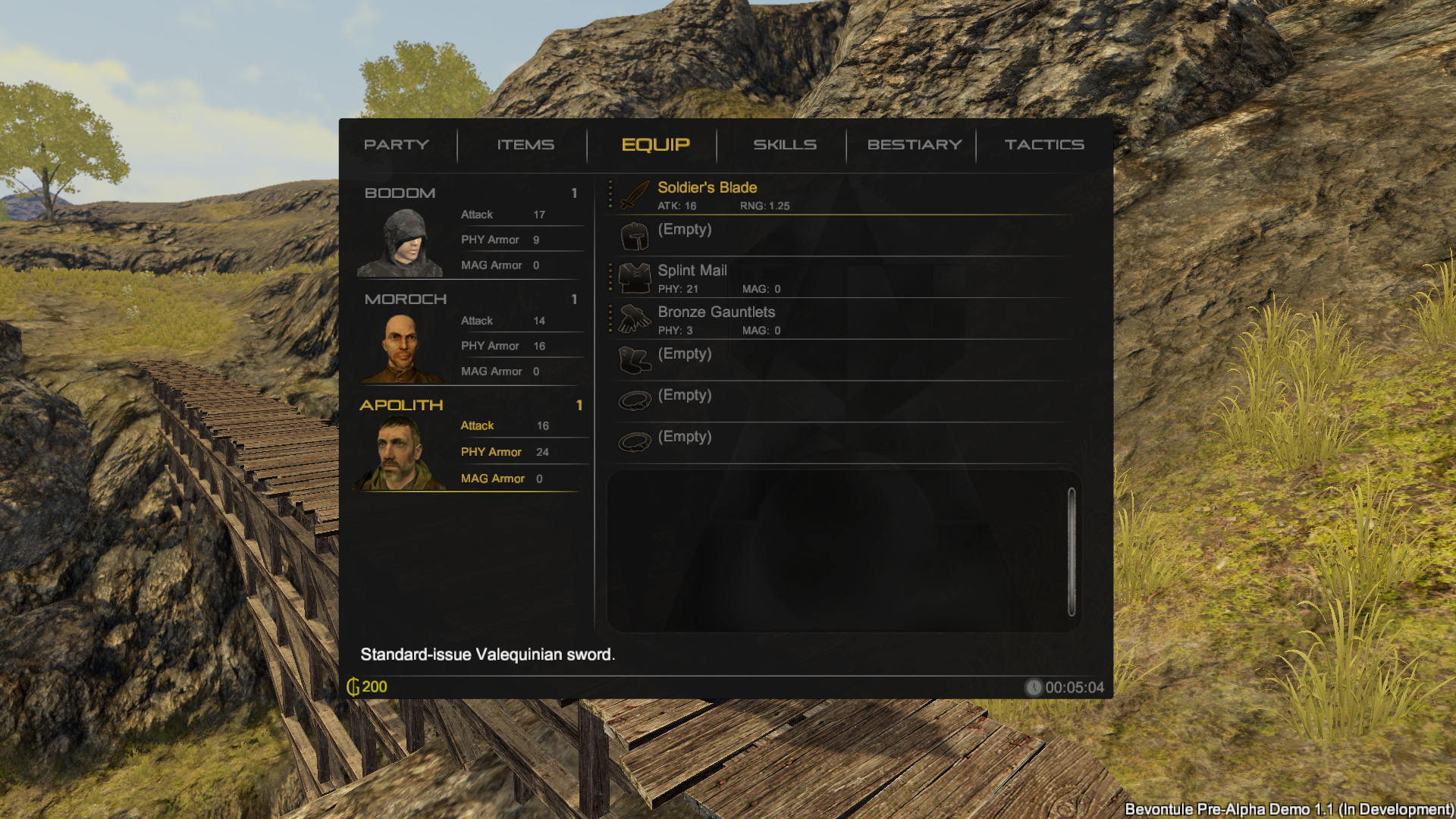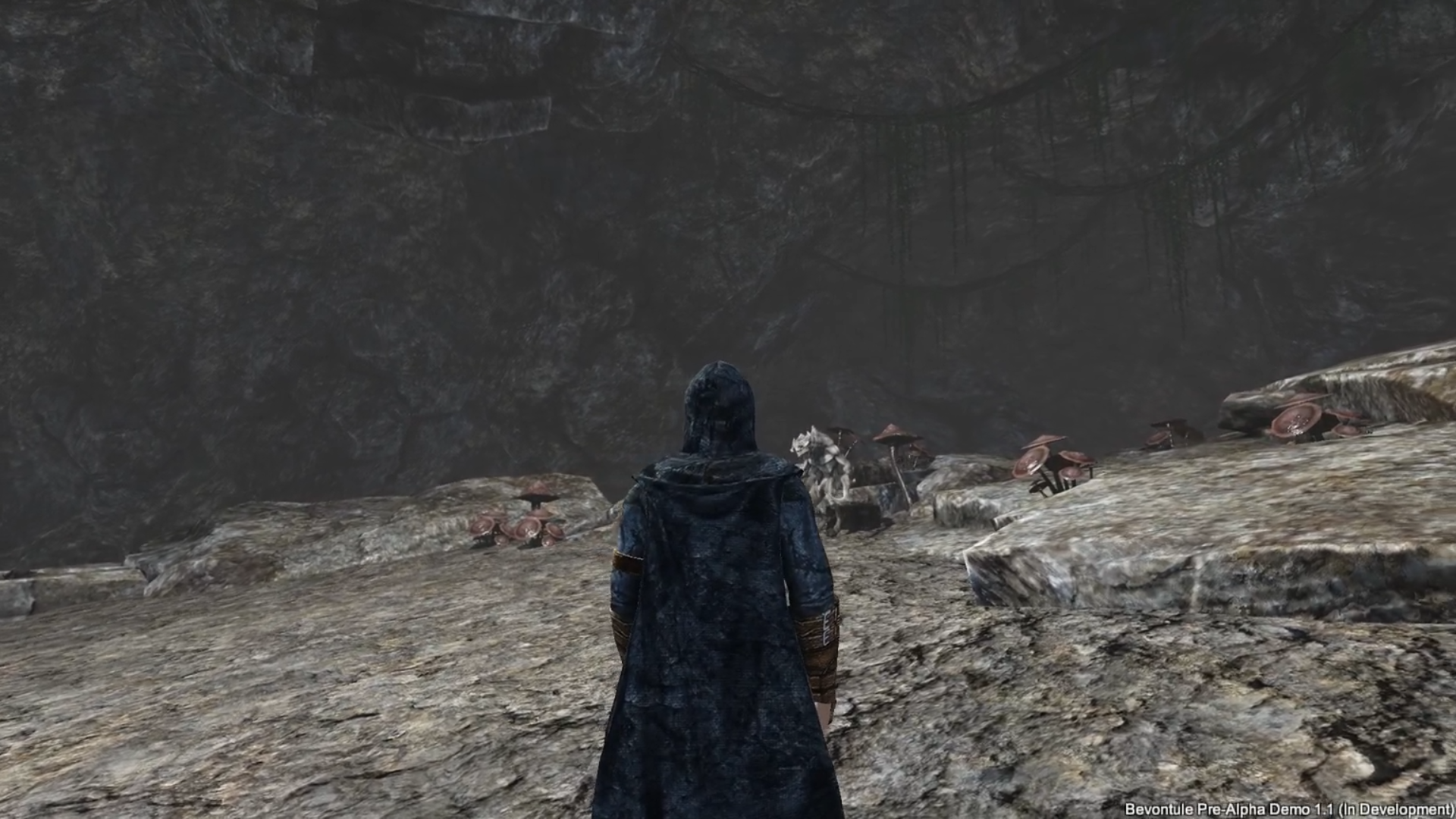As of the most recent Bevontule demo (Pre-Alpha 1.1), we are confident that we have nailed down the high-level combat mechanics of the game. There are a few minor UI tweaks that still need to be made, but by and large, I can finally say that there will be very few remaining large iterations on that particular system.
From here, we’ll be focusing on development of the few remaining subsystems. For this update, I wanted to elaborate (quite lengthily) on the Bevontule skill system. As many of you have noticed from having played the demo, access to all 15 allied skills is currently unlocked and the player is free to use all of them.
In the actual game, this will not be the case (as you may have guessed!) So how will we unlock and acquire skills in the final version? As we’ve said, we played a lot of different RPGs growing up and it’s only natural that our skill system will borrow a little bit from several of them.
Firstly a skill must be ‘learned’. Borrowing from familiar progression systems, all skills are present within a character-specific grid that is something of a mix between the progression systems of FF10, Xenosaga and Dragon Age: Inquisition. This grid will contain several types of skills, which will be covered later, and each skill requires a certain amount of AP (Ability Points) to unlock, which are earned from defeating enemies and other sources.
In order to access and learn late-game skills, the adjacent (pre-requisite) skills must be unlocked and the required AP must be available. There is a final parameter that is used to ‘equip’ a ‘learned’ skill, aptly called EP (Equip Points.) This system is very reminiscent of FF9’s leveling system in which ‘gems’ are accumulated per-character and expended to ‘equip’ or acquire access to a skill during battle. Unlike FF9, however, these skills are not learned by equipment (a very interesting system still) but are learned via the AP progression system.
As is the case with FF9, both passive and active skills can be learned and equipped, requiring AP to learn and EP to equip. As such, not every skill can be used simultaneously and another layer of strategy is added to the overall combat system. Furthermore, this setup allows the character to half-respec, meaning that while the character cannot reset all of their ‘learned’ skills, they can—and often will—juggle their equipped skills to handle certain situations.
There are a variety of different types of skills available to the character. Borrowing some from games like Star Ocean and even some MMOs, there will be world-based skills as well. To summarize, the following types of skills will be implemented: Combat Actives, Combat Passives, Attribute Sheets, Field Actives and Field Passives (subject to renaming possibly?) We’ll look at each of them in depth:
Battle Actives
These are skills that can be used only in battle when learned and equipped. All active skills require SP (Skill Points), which is a character-specific value that essentially takes the place of mana or MP. Battle Actives possess a few unique qualities. Firstly, these types of skills all have a quantity known as ‘Charge Time’ or ‘Turn Cost.’ Most active skills in Bevontule do not occur immediately and the easiest analog to describe this is thinking of skills as they are in a game like Final Fantasy Tactics, the crucial difference being that the skills are explicitly activated after a certain number of turns and not an esoteric global ‘speed’ value.
Battle Actives also are unique in the sense that each one possesses its own ‘upgrade tree’, which could be thought of as a miniature version of the main skills progression system, but contained wholly within the specific skill. This is somewhat of a grid as well, but frankly, the best way to describe it is by looking at a game like Destiny’s gun ‘perk’ system. Each active skill will have a few different tiers of ‘upgrades’, and one upgrade can be chosen from each tier.
As with other skills, each upgrade must be learned AND equipped. This means that a skill has a base EP cost but also has an additional EP cost based on the types of upgrades being used by that skill. This allows even more extreme customization and a character may choose to ‘deck out’ a single skill, using its most expensive upgrades. Or they may draw from a variety of skills that are left relatively ‘weak.’
As an example, take Bodom’s standard offensive skill Slash. Without any modifications, this skill costs 2 EP to equip and 2 SP to use. However, an initial upgrade for the skill does the following:
Double Tap - After executing this skill, insert the skill back into the turn queue at the original turn cost.
This is an obscenely good upgrade, but will be offset by its exceptionally high cost to learn (200 AP) and equip (6 EP.) While we haven’t yet ballparked the maximum amount of EP available to a character, we’ll probably aim for somewhere in the neighborhood of 100. Of course, there will be many other ‘standard’ and ‘generic’ upgrades such as ones that simply increase damage, reduce SP costs and/or charge times, et cetera, that may be found on multiple skills. Double Tap itself, may likewise appear on other skills, even with different AP and EP costs.
Battle Passives
These types of skills only apply during combat, and confer unique benefits that simply don’t fit into any specific category. Like other skills, these require AP to unlock and EP to equip, but they do not have an SP cost associated with them. In this way, these skills can be thought of as always activated and a few examples featuring Moroch (our resident healer/debuffer) may help shed light on how they can be used in Bevontule:
Apothecary - (OK) Extends the range of all thrown items by 50% and increases their restorative effects based on Moroch’s INT.
Special Ingredient - (GOOD) Extends the duration of all of Moroch’s time-based skills by 25%.
Deep Thought - (MEH) Increases Moroch’s INT by 10% when his SP is above 50%.
Genius - (GOD-TIER) All of Moroch’s SP costs are reduced by half. Overrides any other skill-specific upgrades that alter SP.
Here are a few that Apolith (Tank/DPS) might have:
Foulmouthed - (GOOD) Extends the duration of Apolith’s taunt effects by one turn.
Scapegoat - (OK) When near an ally, Apolith has a chance to take and distribute some of the damage intended for that ally. Only works with single-target skills.
Steadfast - (GOOD) When Apolith remains stationary, he receives a 5% physical damage reduction until his next turn.
Attribute Sheets
These can be thought of as passive skills, except they are only able to confer attribute bonuses. Typically, several attributes may be lumped into a single ‘sheet’ and these are equipped just like other skills and require both an AP and EP expenditure. Here are a few examples of what a few of Bodom’s attribute sheets might look like:
Warrior 1 - (2 EP) Increases STR by 5 and HP by 50.
Onichian 1 - (3 EP) Increases INT and WIS by 3 and SP by 5.
Warrior 4 - (7 EP) Increases STR by 25 and HP by 500.
Brute - (10 EP) Increases STR and RES by 5%.
Note that a skill like ‘Brute’ could also be present as a passive skill as well. There is one important distinction to be made. These attribute sheets will apply before anything else in combat, thus, a passive that provides a global stat increase will ‘stack’ atop the others. A character could choose to focus on attribute sheets entirely and forego the traditional learning and equipping of most active skills.
Field Actives
Field-based skills are more infrequent than others, and can only be used outside of combat by a character in the active party. These types of skills are most reminiscent of something from Star Ocean 2 and are character-specific. Often these types of skills will persist for a certain amount of time and cannot be reused until they have gone off cooldown. If the character that used the skill is swapped out of the party or killed in combat, the skill will automatically end and go on cooldown.
In general. these types of skills are only applicable outside of battle, thus, the duration is not decreased while in combat, but only in the field. Finally, most field actives will require an expenditure of SP, possibly as a percentage or minimum required quantity unlike battle actives, which have fixed SP costs.
Musk - Increases the encounter rate and strength of encountered enemies for 10 minutes. Cannot stack with other similar skills or effects.
Whisk - Return instantly to a nearby village or safe zone. Does not have a cooldown or duration and can only be used on the world map.
Field Passives
Very similar to field actives, but with an important distinction being that these types of skills will always apply when equipped and the character is present in the active party. These types of skills, when unequipped, may enter a cooldown period as to prevent rapid toggling of beneficial skills.
Persuasion - Selling prices for items are increased by 10%.
Expert Tailor - Receive a 10% boost to material when crafting armor.
So there you have it, a lengthy glimpse into what we have in store for our skill system. I have to reiterate that many of the fundamentals are already firmly in place, but the front-end UI still needs to be designed. As we move closer towards that goal, we’ll have plenty more to say about the matter and will more than likely need a bit of input as well. Thanks a lot for reading and feel free to post any thoughts or comments below!
As a bonus, enjoy this random and commentated video of us playing (and occasionally failing) at our own demo. which again, can be downloaded right here on IndieDB!




nice article
Thanks! Hope you found it informative!